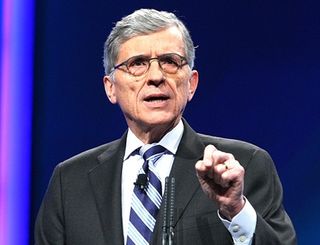Democrats Push FCC's Wheeler on Public File Access Pledge

A quartet of powerful House Democrats has asked FCC chairman Tom Wheeler to act on a pledge they say he made to their caucus recently and make TV station public inspection files—and cable, satellite and radio files when the requirement kicks in for them—machine readable so they can be more easily searched and inspected.
That came in a letter dated Friday (April 29) from Rep. Frank Pallone (D-N.J.), ranking member of the House Energy & Commerce Committee, Anna Eshoo (D-Calif.), ranking member of the House Communications Subcommittee, and two of the most prominent voices on the issue of public file and political ad disclosure transparency Rep. Ben Ray Luján (D-N.M.) and Rep. John Yarmuth (D-Ky.).
They urged the chairman to begin the process "in the near term" and that they agree with the chairman that the FCC "can and should" take action.
In 2012, the FCC decided to make TV station public files—which contain information on political ads, children's programming and more—available online in a central, FCC-administered database. Then, in January of this year, it voted to extend that public file database requirement to cable and satellite TV and radio.
The Democratic legislators, who have been pushing for more transparency on political ads and their funders in particular, said they were encouraged by Wheeler's "specific commitment" to make public files machine readable. TV stations have to upload those files to an FCC database, but do not have to make them machine readable.
A source said that in that meeting, Wheeler said that was the least the FCC could do.
The legislators pointed out to Wheeler that two weeks ago, 179 members of Congress voted to support Luján's H.R. 4179, the Fair and Clear Campaign Act, an amendment to an FCC bill that would have required public files be machine readable.
Broadcasting & Cable Newsletter
The smarter way to stay on top of broadcasting and cable industry. Sign up below
The bill points out that in May 2013, President Obama made machine readability the default setting for government information. Executive orders do not apply to independent agencies like the FCC. The President does not vote on set-top box proposals or Open Internet orders, but his call for FCC action on both those was made clear by the Administration.
"With unprecedented spending from super PACs on broadcast advertisements during the current election cycle, this commonsense request is an essential first step to shedding sunlight on our current political system," the legislators wrote.
Wheeler has been reluctant to explore the likely next step, which would be to tighten the disclosure rules, or tighten enforcement of the current rules, requiring TV and radio political ads to include on-air disclosures of those funding them.
Yarmuth and the other signatories to last week's letter have been strong supporters of that as well, with Yarmuth leading that legislative charge.
Democrats say not requiring disclosure of the actual funders of PACs with names like Friends of Democracy or Americans for Puppies and Apple Pie, needs to change and have expressed some frustration privately, and some publicly, that the chairman has not acted.
Wheeler has said opening an inquiry or rulemaking on tightening the disclosures is not a priority at this time.
An FCC spokesperson said the commission had not received that letter at press time.
Contributing editor John Eggerton has been an editor and/or writer on media regulation, legislation and policy for over four decades, including covering the FCC, FTC, Congress, the major media trade associations, and the federal courts. In addition to Multichannel News and Broadcasting + Cable, his work has appeared in Radio World, TV Technology, TV Fax, This Week in Consumer Electronics, Variety and the Encyclopedia Britannica.

